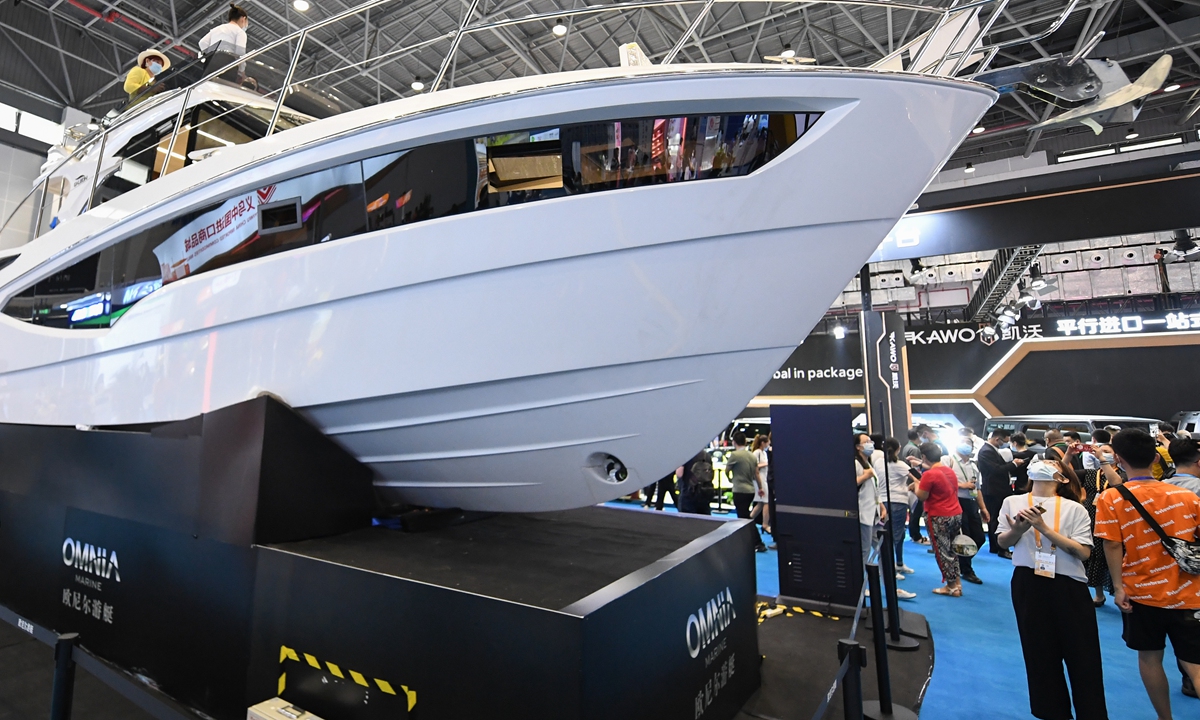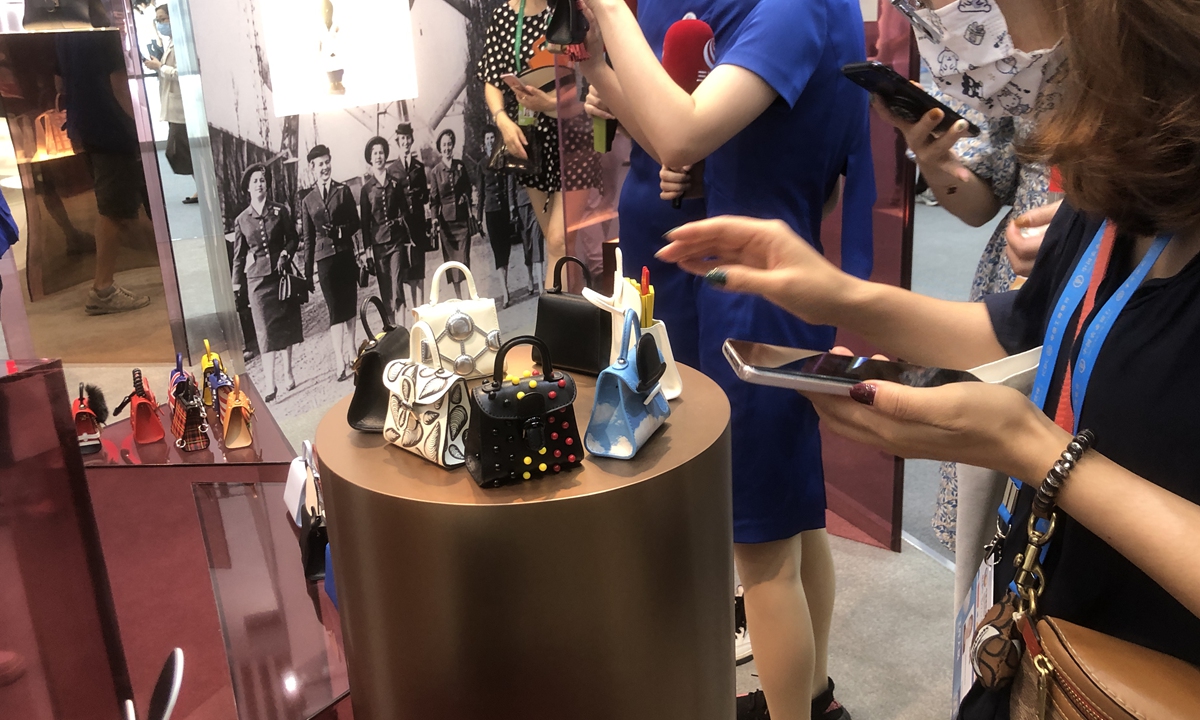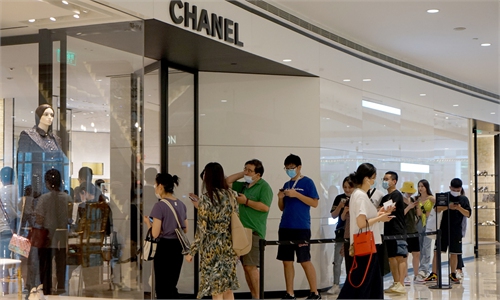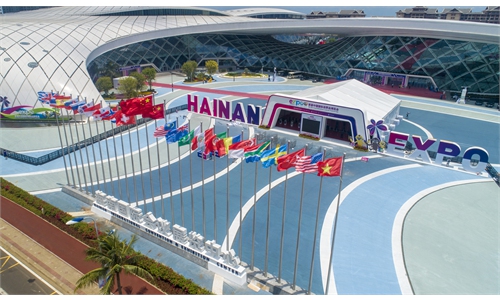International luxury houses pin hope on Chinese consumption market
China to become largest luxury goods market by 2025

A yacht is on display at the China International Consumer Products Expo in Haikou, South China's Hainan Province on Friday. Photo: cnsphoto
From premium watches and tiny but exquisite jewelry, to high-end cosmetics, luxury cars and yachts, a slew of leading international luxury brands are vying for attention during the ongoing China International Consumer Products Expo (CICPE), which runs from Friday to Monday in South China's Hainan Province, as they are pinning hopes on China, the only economy that achieved positive growth last year after emerging from the virus-trapped mire.
The fact that Chinese consumers cannot release their purchasing power globally due to travel restrictions caused by the COVID-19 pandemic has offered unexpected benefits to luxury brands by making a timely shift to turn the health crisis into an opportunity. In order to grasp the huge Chinese market, it is now the turn of luxury brands to deliver their products to the hands of Chinese consumers.
Several executives of high-end brands interviewed by the Global Times on the sidelines of the expo said that the Chinese market turned out to be the only market that achieved a year-on-year increase even during the virus-plagued 2020, and they will make bigger footprints in the market based on the huge potential of domestic consumption and government's favorable policies.
Visitors stream continuously into the No.5 exhibition hall, which features high-end fashion, cosmetics and fashion brands, on the first day of the mega expo.
They seem quite fascinated with the products exhibited, busy observing watches worth over a million yuan from Switzerland, trying on bags from Belgium and perfumes from France, imagining the shopping scenes they could enjoy abroad.
Viya, one of China's top livestreamers, also visited the exhibition hall. She treated the expo as an opportunity to explore ideal goods for her audience at the livestreaming show on Taobao on Friday night.

Photo: Zhang Hongpei/GT
Swiss luxury watchmaker Hublot, part of French group LVMH, told the Global Times on Friday that "the Chinese mainland market is important for Hublot. Our global growth mainly comes from China, which is a miracle."
In 2010, the Chinese mainland market accounted for less than one percent of its global sales, but rose to 15 percent in 2020.
Having established eight specialty stores in the Chinese mainland, "we look forward to expanding to 10-11 boutiques as soon as possible this year, while further accelerating the deployment of online e-commerce channels to provide consumers with a more complete shopping experience," the company said.
The world's three luxury houses - LVMH, Kering, and Richemont - all present extensively at the CICPE with their latest high-end products.
Yves Morath, commercial counselor of the Embassy of Switzerland in China and head of Swiss Business Hub China, told the Global Times on Friday that the Chinese luxury goods market is a very dynamic one and leads the demand for Swiss watches, which is one of Switzerland's main lines.
Two of the top 10 watch brands come from Switzerland, and the increasing purchasing power of Chinese consumers, who now tend to pursue high-quality products, go well with Swiss products, Morath said, adding that China became the biggest export destination for Swiss watches last year for the first time, while its exports to other markets dropped.
In 2020, Swiss watch exports fell by 21.8 percent to 17 billion Swiss francs ($18.6 billion) compared with the previous year as COVID-19 erode revenues, data from the Federation of the Swiss Watch Industry showed.
Italian luxury house Etro posted a 12 percent increase on a yearly basis last year in China market, thanks to a consumption rebound from May last year, which helped cushion the impact of COVID-19 in the early part of 2020.
"We and other global brands enjoy the benefits brought by rising domestic consumption because Chinese consumers face travel restrictions during the pandemic. What's more, the local Chinese governments are actively encouraging domestic consumption in many ways and the expo here is a vivid example of the synergy between domestic and international markets," Umberto Temporini, the general manager of Etro China, told the Global Times on Friday.
Etro has made a two to three-year plan to expand its footprint in China where it has currently established 13 stores.
Apart from expensive high-end luxury global brands, accessible luxury or better-life brands targeting young Chinese customers are also holding firmly onto the rapidly growing domestic consumption market.
Coach, a leading brand of modern luxury accessories and lifestyle collections under New York-based fashion house Tapestry, realized positive growth in sales in each quarter last year in the China market, rising against the downward trend globally, according to Peddy Wang, director of Corporate Communications Greater China at Coach (Shanghai).
"For us, the China market is definitely in the leading position, and we optimistic about the consumption market with national policy support, stimulating consumers' pursuit for high-quality lifestyle goods," Wang told the Global Times.
She said the firm plans to open at least 30 new Coach stores within the year to meet more demand especially, in non-first-tier cities like Wuhan, capital of Central China's Hubei Province, and Changsha, capital of Central China's Hunan Province.
A report by Bain said that China was the only growth market among major destinations for Swiss watchmakers, with exports up 20 percent to almost 2.4 billion francs, while Chinese luxury consumer purchases have shifted to local stores due to travel restrictions.
China is on track to become the biggest luxury market by 2025, as wealthy Chinese consumers travel less and spend more at home, according to the report.
Chinese luxury goods sales almost doubled on a yearly basis in 2020, compared with the global sales decline of 23 percent.



